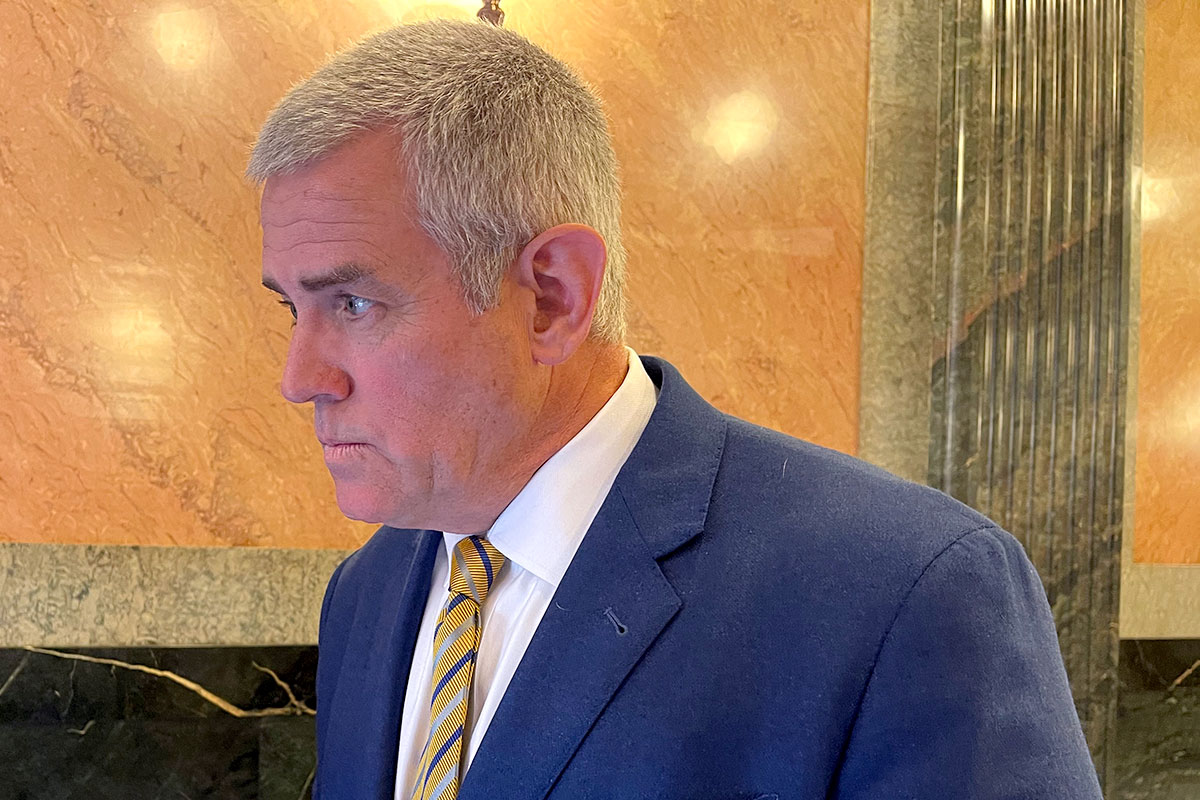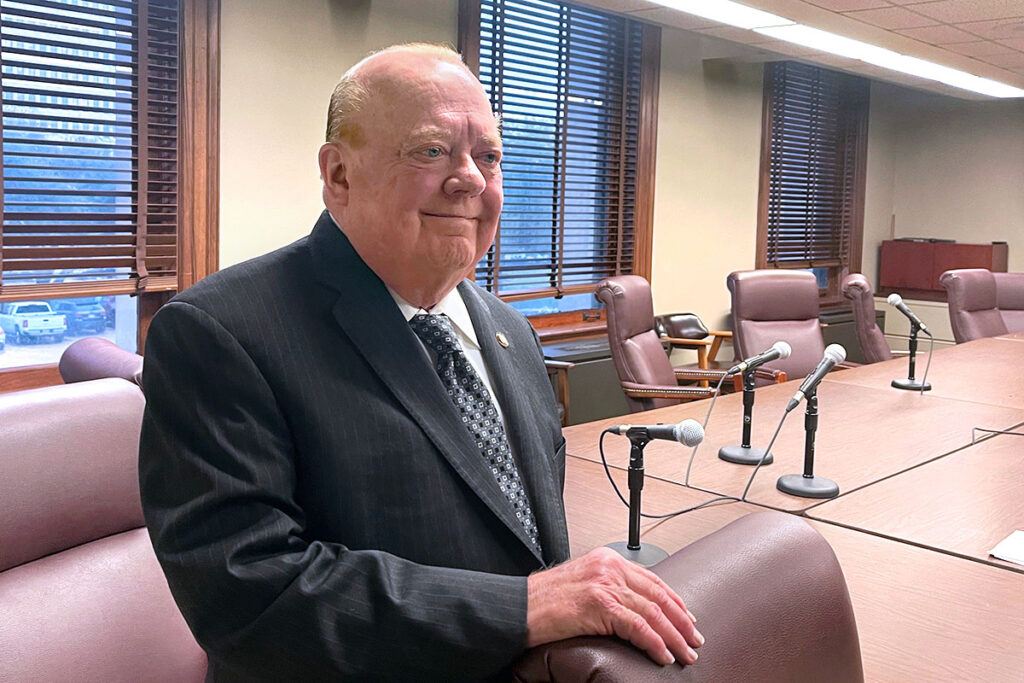Mississippi citizens will not be able to organize and vote on issues using ballot initiatives any time soon after a Mississippi Senate leader allowed legislation that would have revived the option to die on calendar due to multiple concerns—including his fear that voters could use an initiative to repeal the state’s “right-to-work” law, which severely limits labor union organizing in the state.
The Mississippi Supreme Court nullified the ballot initiative process in a 2021 ruling that also killed a voter-approved medical marijuana law. Senate Concurrent Resolution 533, which lawmakers in the upper chamber passed on Feb. 9, would have restored a more limited version of the ballot initiative process.
The House made substantial modifications to the Senate’s bill, though, including removing a provision that said voters would not be able to “amend or repeal the constitutional guarantee that the right of any person to work shall not be denied or abridged on account of membership or nonmembership in any labor union or organization.” They also inserted a prohibition on using ballot initiatives to amend Mississippi’s highly restrictive abortion laws, which polls show most voters oppose.
After the House made its changes, Mississippi Senate Accountability, Efficiency, Transparency Committee Chairman John A. Polk could have sent the bill back to the Senate floor for concurrence or he could have called for a conference between the two chambers to iron out their differences. Instead, the Hattiesburg Republican allowed it to die on deadline Thursday.
Polk told the Mississippi Free Press he did not see a path to an agreement.
“We were so far apart. I don’t think there was any way we would ever get an agreement in conference,” the senator said.
The chairman said it “was disturbing to me” that House lawmakers removed language from the bill that would have prohibited voters from altering Mississippi’s right-to-work law.
“They took that out of the bill we sent, and that was disturbing to me because I’m not sure why they did it,” he said. “Mississippi needs and should be a right-to-work state.”
While supporters of right-to-work laws say they increase worker freedom by banning union membership requirements as a condition of employment, opponents argue that such laws lower wages and weaken worker protections by curtailing the ability of labor unions to organize.
Other sticking points Polk cited include the House’s decision to kill a companion bill that would have created a ballot-initiative statutory guideline and the House’s attempt to lower the number of signatures required to put an issue on the ballot.
Senate Wanted Higher Signature Threshold
Between 2018 and 2019, pro-medical marijuana petitioners for Initiative 65 gathered more than 228,000 signatures to put the issue on the ballot. Under the old system, organizers only needed about 106,000 verified signatures, but petitioners at the time told the Mississippi Free Press they collected more than twice as many due to high rates of local election officials rejecting signatures for verification. Voters approved Initiative 65 in a 68.5%-31.5% vote in November 2020.
The Mississippi Supreme Court overturned Initiative 65 in May 2021. A majority of justices ruled that, even though the Mississippi Constitution guarantees citizens the right to put issues on the ballot, the initiative system was no longer valid because the 1992 law specified that citizens must gather signatures in five congressional districts—and Mississippi has only had four congressional districts since 2000 redistricting due to population decline.

Days after the 2021 ruling, Sen. Chris McDaniel, R-Ellisville, told the Mississippi Free Press that many of his colleagues believed the old system was “too easy” and that “they don’t trust the people.” Sen. Hob Bryan, D-Amory, told the Mississippi Free Press at the time that he opposed restoring initiatives at all, calling it “a terrible way to make public policy.”
But after the ruling, House Speaker Philip Gunn and Lt. Gov. Delbert Hosemann both expressed support for restoring ballot initiatives, though attempts to do so in 2022 and now in 2023 both failed. The Legislature did approve and Gov. Tate Reeves signed a weaker medical marijuana bill into law last year that allows significantly fewer people to access treatments than the stricken voter-approved law would have.
The original version of this year’s bill proposed requiring verified signatures from 12% of all eligible voters, which would have put the new required total at about 250,000. The House version would have lowered the threshold to 12% of turnout from the last election for governor, or about 100,000 signatures based on the 2019 election.
“They came down to a very low number, a number there’s no way I could get close to,” Polk said. “I’ve not heard anybody say that that number could be negotiated, and I’m at 240,000. Under the way we wrote the law, it was 12% of registered voters on the day of (the most recent) presidential election, which is 240,000.”
Lt. Gov. Delbert Hosemann, a Republican who serves as the Senate president, released a statement following the bill’s death on the calendar Thursday.
“I have consistently said I am in favor of an initiative process in Mississippi. I trust the voters of the state, both in who they elect to office and on policy matters,” he said. “A number of Republicans in the Senate have a different opinion on the initiative issue. This is the legislative process, and we will continue that process.”
‘We’ve Tried It Twice Now’
On Thursday, Sen. Polk told the Mississippi Free Press that the colleagues he spoke to “did not show enough support for the initiative this year to be able to continue negotiations.”
Speaker Philip Gunn, R-Jackson, said he considered it “unfortunate the whole process died” while addressing the media Thursday.
“So we tried to remain as close as we could to what the original plan was, and obviously, they didn’t agree with that,” he said. “We’ve tried twice now.”

Speaker Pro Tempore Jason White, R-West, told the press he thought the Senate would allow a chance for further discussion. “I’m surprised,” he said.
White said many constituents have reached out to House members saying that they want ballot initiatives restored and that the House was willing to move the threshold up to 140,000 signatures. Polk told the Mississippi Free Press he has not heard any constituents ask for ballot initiatives back, though polls have found overwhelming support for restoring them.
“We thought we had made several compromises trying to get the Senate on board on this issue, and so we were disappointed to see it die and (the Senate) not at least invite conference and let’s see where we can go with it,” White said Wednesday. “It’s disappointing. We were hoping to see that move. People have demanded it and asked for it, and I think on the campaign trail this summer and fall, you’re going to hear people, constituents, voters talking about it”
The House added its prohibition on allowing citizens to use ballot initaitives to change the state’s abortion laws amid concerns voters could reverse Mississippi’s near-total abortion ban that took effect following last year’s U.S. Supreme Court ruling in Dobbs v. Jackson Women’s Health Organization. In a 2011, Mississippi voters rejected a broad abortion ban when they defeated the Personhood Amendment ballot initiative in a 58%-42% vote. Lawmakers continued passing abortion bans, though, including the 2018 one that ultimately led to the Dobbs case.
Rep. Kent McCarty, R-Hattiesburg, told the Mississippi Free Press on March 14 that he would like to restore a system like the 1992 one, with only a change in the number of congressional districts petitioners must reflect ballots from to reflect the current number figure. He called the version the House passed “too restrictive” with limits like the one on abortion-related initiatives and its requirement for the Legislature to approve an initiative proposal before it goes on the ballot.
“I don’t think that’s what the voters want. I think they want an opportunity to actually effect change and policies that they think are important. And if we’re going to give them an opportunity to do it, we need to let them actually do it,” he said.
“So I think that’s a high enough bar, and it hasn’t caused us any issues in the past, and I’d just like to see us go back to that,” he added. “I like to go back to what we had before. I think that’s what the voters expect, and I think that obviously, we had that on the books for, I think, 30 years, and there were only a handful, a very small number (of) successful citizen-led initiatives,” he said.
‘It Was A Different World’
Under the 1992 ballot initiative system, citizens were able to change the law by amending the state constitution, putting any voter-approved laws largely out-of-reach of lawmakers. But both the House and the Senate proposals to restore ballot initiatives would have prohibited voters from using initiatives to change the state constitution, allowing only a change in statute—which lawmakers could later alter or repeal if they did not like what voters did.
Sen. Polk and Rep. Nick Bain, R-Corinth, each presented the bill to their respective chambers. Both said the fact that the word “marijuana” would have been in the state constitution if the Supreme Court had not struck down the medical marijuana law were factors that led them to oppose restoring a system like the old one.

The secretary of state’s website lists 78 initiatives that voters have gathered signatures for and sought to put on the ballot since 1992, including several that citizens were attempting to put on the ballot in 2021 before the state’s high court nullified the law. Since 1992, voters have successfully passed four of those initiatives, including two related to voter identification requirements; one that prohibits the state from using eminent domain to take private land; and the medical marijuana law.
McCarty and others who support restoring a system more akin to the old one argue that the bar was already high enough, considering the small number of initiatives voters approved over the past three decades.
But Polk told the Mississippi Free Press that social media and online organizing changed the landscape, which is why he is adamantly in favor of raising the signature threshold as much as possible.
“When the bill was passed (in 1994) it was a different world. We didn’t have social media driving (things). We didn’t have companies that were out there trying to make changes to the government through social media. We had newspaper, we had radio, we had TV, and that was about it. Maybe some magazines. So I think what’s happened is it’s changed, and it’s easier to get signatures than it would have been 30 years ago.”










